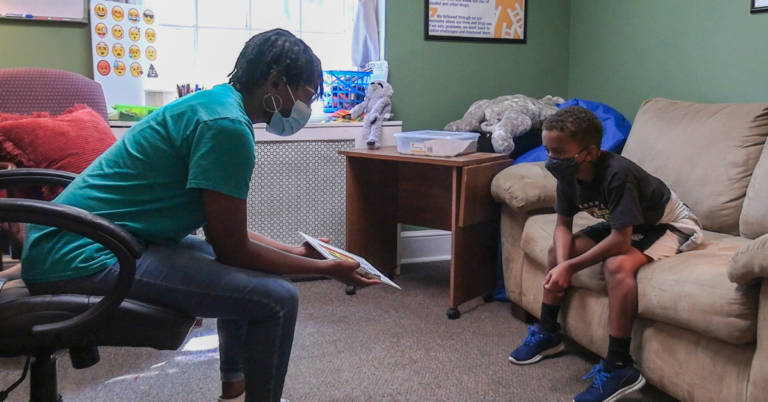Allison Becker is the Child and Family Therapist Supervisor for Crossnore’s Hendersonville Campus, serving outpatient clients. Kenzie Mizell is the Child and Family Therapist Supervisor for the Avery Campus, serving residential clients.
7:00 am
Allison, Outpatient – During the summer, this is when I wake up and start my day. (During the school year that happens earlier, unfortunately – the kids have to be at school by 7:50!) It’s the power hour for me. I get myself clean and dressed, and make sure my kids are dressed and ready to go to camp. They make their own breakfast, but I make lunch! Lots of fresh fruits and veggies, as well as some protein to fuel them for their busy and active day.
Kenzie, Residential – I’m sleeping!
8:00 am
Allison, Outpatient – CrossFit!! A few times a week, anyway. This is a huge part of my self-care. I lift heavy weights for fun. I try to work out at least three times a week, four if I’m lucky. I also do less fun things like cardio and burpees and box jumps, but that is the cost of admission, I suppose…
Kenzie, Residential- Wake up. (Sometimes reluctantly. My staff and clients know I’m a much better therapist and human later in the day!) I feed my Facility dog, Yona, breakfast and take her out for a walk. I grab my own breakfast and coffee. Drive to work.
9:00 am
Allison, Outpatient – On CrossFit days, I usually am stinking pretty badly at this time. Also, STARVING because I just busted my butt at the gym for an hour. So, first stop is typically Starbucks for caffeine and food. Both are necessary fuel for the day ahead. Then, I head home and shower so I can stand to be in my own presence. On non-workout days, this is usually the time when I start meetings. Most days I do the majority of my sessions in the afternoon, so morning time is spent catching up on documentation or attending meetings.
Kenzie, Residential- I arrive at the office, greet other staff members (Yona gives much better good morning greetings than I do), quick check ins about any support needed during the day, check my inbox. Emails are non stop and our largest communication method, so I spend a lot of time with my gmail account! As a therapist on a kiddos team, we are consistently kept in the loop via “general information forms,” and “changeover forms” for each kid. These forms are used by our fabulous support staff to share information with a child’s case manager, therapist, appropriate supervisors, medical staff, and social workers. They can include information about doctors visits, behaviors cottage parents are seeing, progress kids are making, and other varying information.
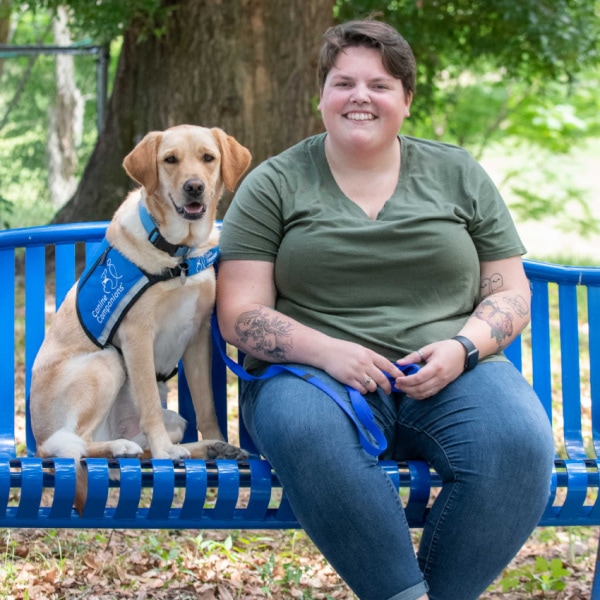
10:00 am
Allison, Outpatient – Usually, I am still in meetings at this time. These might be supervision with my team (I supervise four clinicians right now), consultation for a treatment modality like EMDR or DBT, a team meeting, or supervision with my own mentor for my doctoral program. Yep, you read that right…I’m getting a doctorate in Marriage and Family Therapy! Who needs free time?! Anyway, I meet with her twice a month individually or with another clinician, and once a month in a group supervision meeting.
Kenzie, Residential- Complete pending notes/ documentation. Each kiddo enrolled in our service has to have a CCA and treatment plan (along with other intake/ongoing documents) and after each session clinicians must write a service note. Sometimes it can be a task to keep up with documentation, especially if you have a lot a sessions each week. Supervision, time management, and a solid routine help me complete notes in a timely manner.
11:00 am
Allison, Outpatient – This is when I typically write notes. Not sure why it always works out this way, but somehow it does. Writing notes is not why people become therapists, believe you me! But it is a necessary part of the job so we can document the progress our kiddos make and track how close they are to achieving their treatment goals.
Kenzie, Residential- Check in with my supervisor, break for Yona. I have weekly supervision sessions, however we check in frequently about support needed on campus for our clients and other clinicians, following up on action plans, and keeping each other in the loop about changes. I will also reach out to Cottage Parents, Case Managers, Residential Directors, or other appropriate staff to advocate for clients, process situations regarding clients, and see how clinical can best keep meeting our clients’ needs.
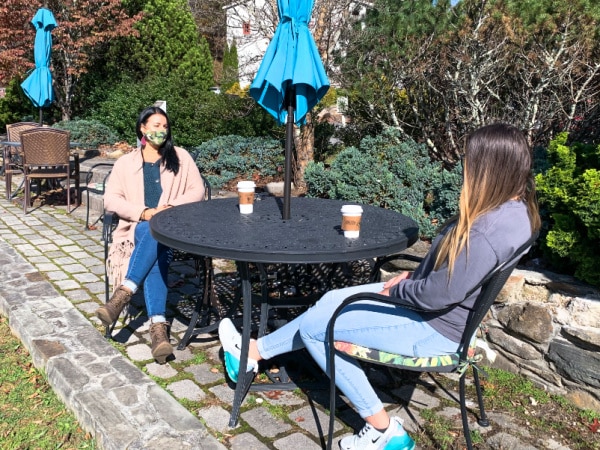
12:00 pm
Allison, Outpatient – This is usually the time when I transition to the office to prepare for my in-person sessions with my kiddos – my favorite part of the day! I love meeting with clients, that is absolutely why I became a therapist. I love helping my kiddos forge their paths to healing and figure out their identities. It’s this part of my job that fuels me! Oh, and I eat lunch (most days).
Kenzie, Residential- At this time, my team and I have lunch together in the building. We attempt each lunch to focus on self care/sanctuary model and try to avoid “working lunches.” Sometimes we are successful… sometimes not so much. Progress not perfection, HA! We love when our friends from other departments come to join us. Lunch is my favorite time to enjoy my team’s company and allows us time to hold space for one another- with laughter and lightheartedness.
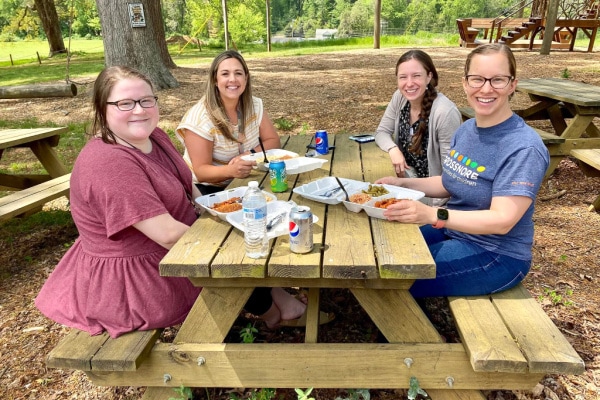
1:00 pm
Allison, Outpatient- This is when I have my first session most days. Unlike a residential campus, we have limited spaces in which to conduct sessions. On rainy days we’re limited to my office, but not to worry! There are plenty of toys, fidgets, games, art supplies, and a sand tray with which to facilitate conversations. Sunny days we also have the option of the front yard or the playground out back. I love doing sessions outdoors when the weather is nice!
Kenzie, Residential- Pick up a client from school and have a session. Sessions on the Avery campus can take place in an array of places depending on availability: In my office, the group room, the playroom, the gym, the horse barn, a play ground, walking around campus, sitting outside, at the tennis courts. My sessions typically last between 30-60mins.
2:00 pm
Allison, Outpatient – Typically, this is when I do my second session of the day. On days when I don’t have a session at this time, I am usually catching up with the foster care team about mutual clients, meeting with our office manager Karen about new referrals, or checking in with my team to make sure they have what they need to do their jobs. We have a lot of fun here in the Hendersonville office – the laughter and friendship helps make the hard work less hard.
Kenzie, Residential- Another session with a student and a walk for Yona. Sessions can range between an individual session with just the child and therapist, family therapy session with mom, dad, and child, a group session with several different children on campus, a potential crisis session, or a family therapy session with a child and their sibling.
3:00 pm
Allison, Outpatient – Session number three starts now. After school times are a hot commodity, and the office is usually busy at this time. Most of my clients are teenagers. We sometimes play card games while they talk to me about their challenges and process through the hard things they have endured in their lives. Other times we color or draw or share music that is meaningful to our lives. I find that engaging my kids in activities while we talk often takes some of the pressure off and helps them open up more easily. It is also a sneaky way that I help them find effective coping strategies!
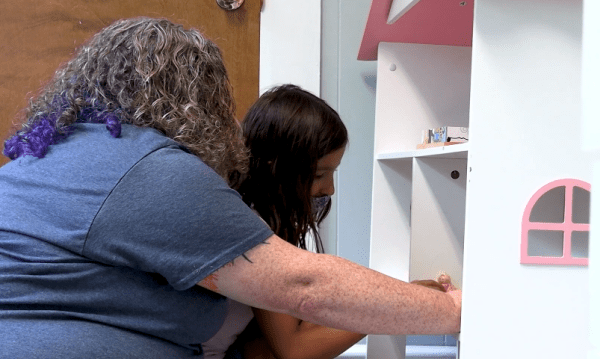
Kenzie, Residential- Another session with a kiddo, break time for Yona. In sessions, clients share and process a lot of different things. Some sessions we process through previous trauma, learn emotional regulation skills, or engage with their feelings in different ways. Children are free to choose how they like to spend their session time.
4:00 pm
Allison, Outpatient – Last session of the day! I try to save this slot for family sessions. They are my favorite but it can be a challenge to juggle all the dynamics that happen with more people in the room. Family work is so important because children’s symptoms and behaviors are usually influenced by their environments. If I can help a family find more effective ways of communicating and functioning, my kiddos are more likely to be able to maintain their progress long term.
Kenzie, Residential- Supervision with a clinician on my team. As a supervisor, I meet with each clinician on my team weekly to staff their clients individually, check in on their professional development, and provide space for processing. My team members are amazing and come each week with agenda items ready to establish action plans on how to best support their clients. Sanctuary model and self care are at the core of our supervisions, allowing clinicians time and space to validate emotional impact of the job and heal from potential secondary trauma.
5:00 pm
Allison, Outpatient – Most days this is when I get to leave the office. But my work is not done! Time to go pick up my own kiddos, figure out dinner, and start the evening wind-down routines. Evenings are reserved for family time. It’s so important to maintain our personal relationships and get some relaxation and fun. On Mondays we head to one of the local breweries and play Music Bingo. SO MUCH FUN!
Kenzie, Residential- Sometimes my days go much later than 5pm. However whenever I am finished for the day, Yona enjoys a long game of fetch down at the field along with some well-earned belly rubs! I decompress with music and talking with my friends on the phone. Once a week I attend my own therapy sessions to ensure I am prioritizing self care so I can be the best therapist and human for my team and my clients.
Taking Care of Ourselves, Too!
In this job, each day can look very differently. Sometimes our days are filled with client sessions, therapist supervisions, leadership meetings, administrative tasks meetings, or paperwork. With these varied tasks our roles experience a high level of stress which can lead to burnout. We make sure to focus on our time outside of work as well and take necessary breaks with time away. Our jobs are never boring, to say the least, but working with these kids and amazing clinicians keeps us coming back each day.
